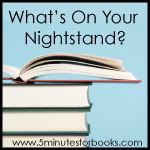Please note that since completing this read, I haven't bothered to find out anything about Kate Morton so all of my comments are related to this title alone without any additional knowledge of her or her writing history.
Did I like this book?
The short answer:
Yes, with some exceptions.
The long answer:
I found Morton's style of story telling to be captivating. The book tells the story of four women who lived in three different periods in history. All of the women are connected in some way with others and the mystery of the book is exactly how their paths cross. The story slowly unfolds as you jump between the years 1900 and 2005 keeping you guessing the whole while. Personally I'm a fan of stories that cover decades and I don't mind bopping about picking up clues to how everything ultimately fits together. I know that not everyone enjoys that style, but I do.
As this book is part mystery it would be very easy to provide spoilers but I will refrain from doing so. Instead, I'll share part of the description from the book jacket for your information:
"A tiny girl is abandoned on a ship headed for Australia in 1913. She arrives completely alone with nothing but a small suitcase containing a few clothes and a single book - a beautiful volume of fairy tales. She is taken in by the dockmaster and his wife and raised as their own. On her twenty-first birthday, they tell her the truth, and with her sense of self shattered, and very little to go on, "Nell" sets out to trace her real identity. Her quest leads her to Blackhurts Manor on the Cornish coast and the secrets of the doomed Mountrachet family."
I don't know about you, but I thought that sounded really interesting and mysterious!
Despite my concerns not to provide spoilers, I do feel compelled to share my hesitations about the read so that you can make the best decision for yourself regarding your own desire to read it.
As The Forgotten Garden
Regarding concern #1 (poor writing): I am happy to report that this book does not suffer from poor writing skill. If Morton is a bad writer, I didn't notice. She held me captive to the pages during the entire read. It's hard to find books which keep you engrossed in them from start to finish but such was the case with me and The Forgotten Garden
Regarding concern #2 (foul language): I didn't notice any at all so I'm sorely tempted to claim that there wasn't any. However, if another reader told me that they found an "unpleasant word" or two I wouldn't be surprised. I usually only focus on the problem if these words are used in excess. (Excess, for me, being used more than four times and in what I would consider to be rather ridiculous and unncessary circumstances.) Morton never felt the need, so far as I'm concerned, to cheapen the book with cuss words.
Regarding #3 (explicit sex scenes): There is a particular illicit relationship which takes place in this book which is flat out disturbingly wrong. You can see it coming and when it hits you very well understand what is happening. (The incident itself is contained to one chapter.) The way she describes what happens is not very explicit. Of course, I rather wish it hadn't been there at all but, for what it's worth, she is more discrete than most in her description. You know what's happening but it is not written out as a play-by-play.
As I say, you can see it coming a mile away and when it happens you could easily skip the chapter and miss only one item which is important to the plot (but you can put other pieces of the puzzle together to answer any questions you might have).
All in all, I found this book to be a really fun summer read. I cared about each one of these main female characters quite deeply and, as I mentioned, found it difficult to live normal life during the reading of this book! All the same, I don't know that I would necessary seek out another Morton title. Of course, if the opportunity presented itself to pick up another very conveniently (as was in the case with this one) I likely wouldn't turn it down either!
What about you? Have you ever read Kate Morton before? What were your thoughts? Any advice or recommendations to offer to myself and others?

















